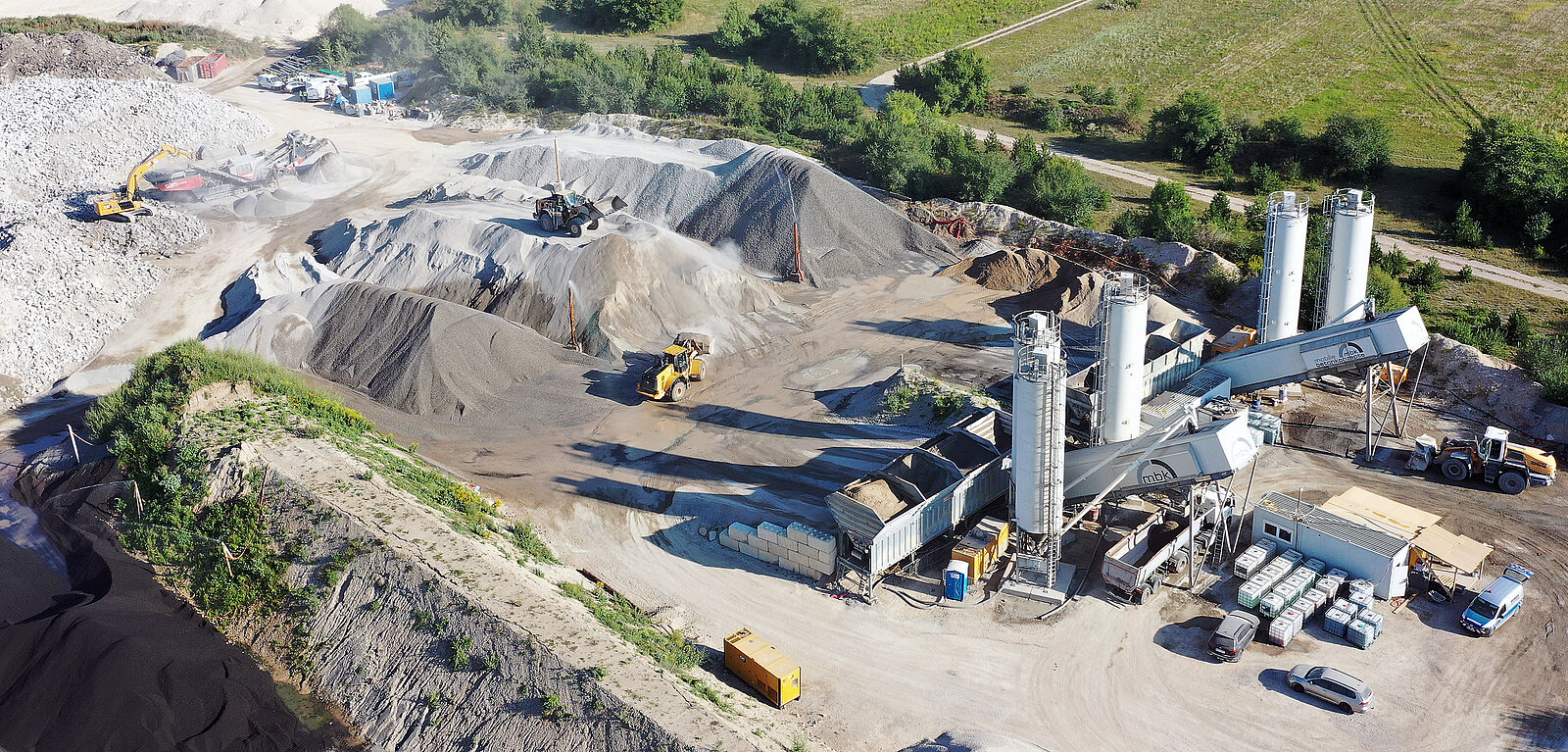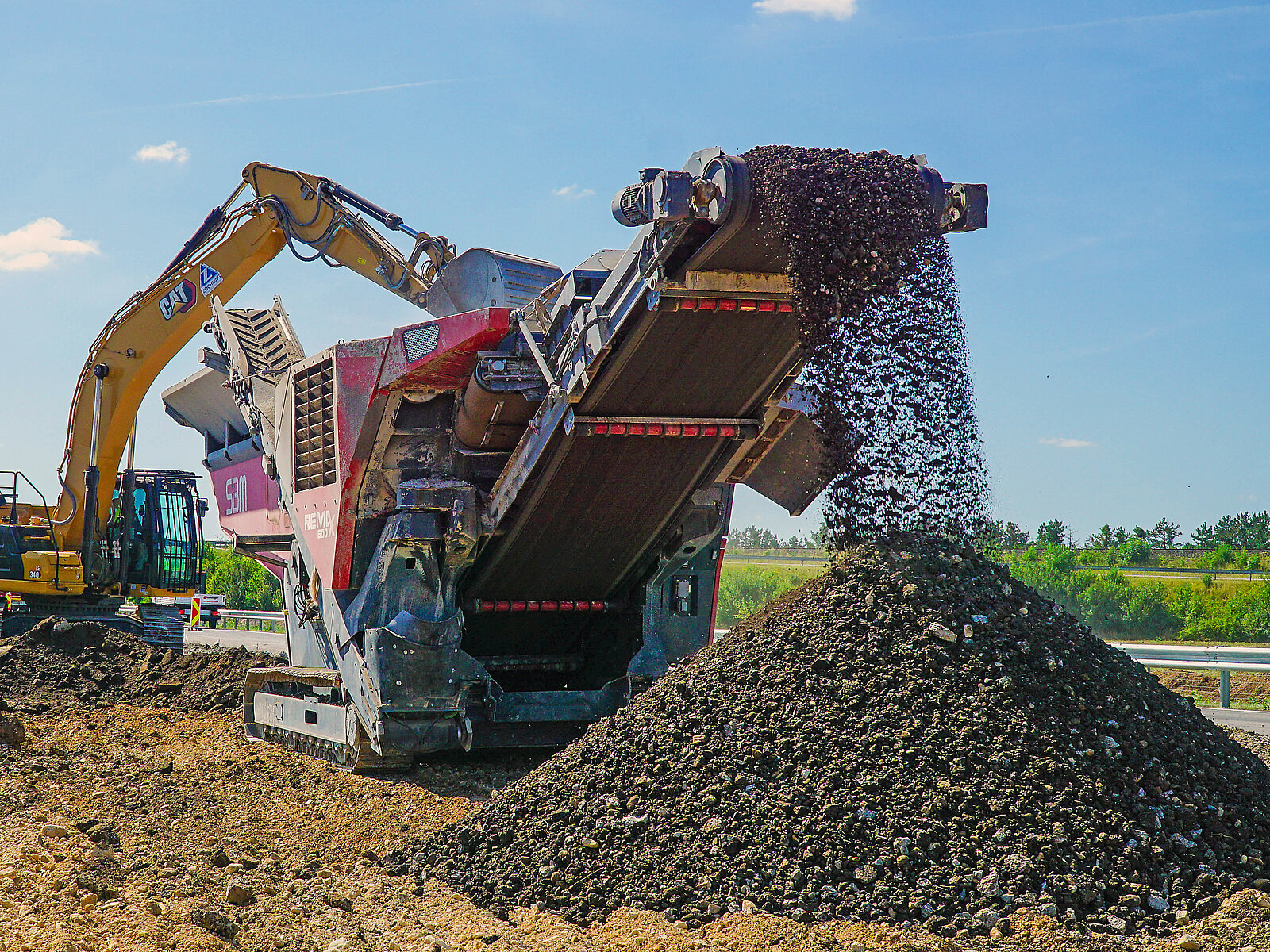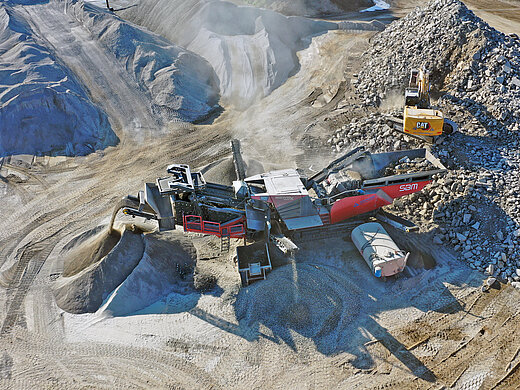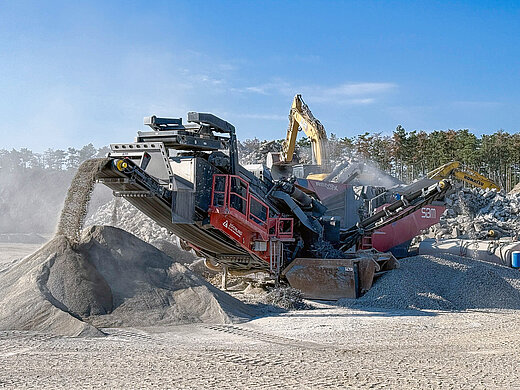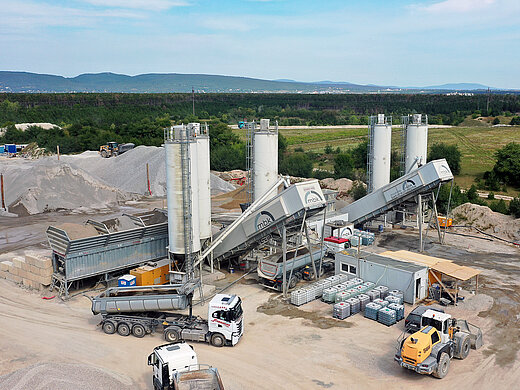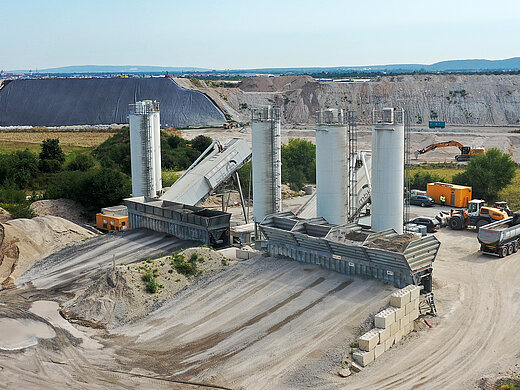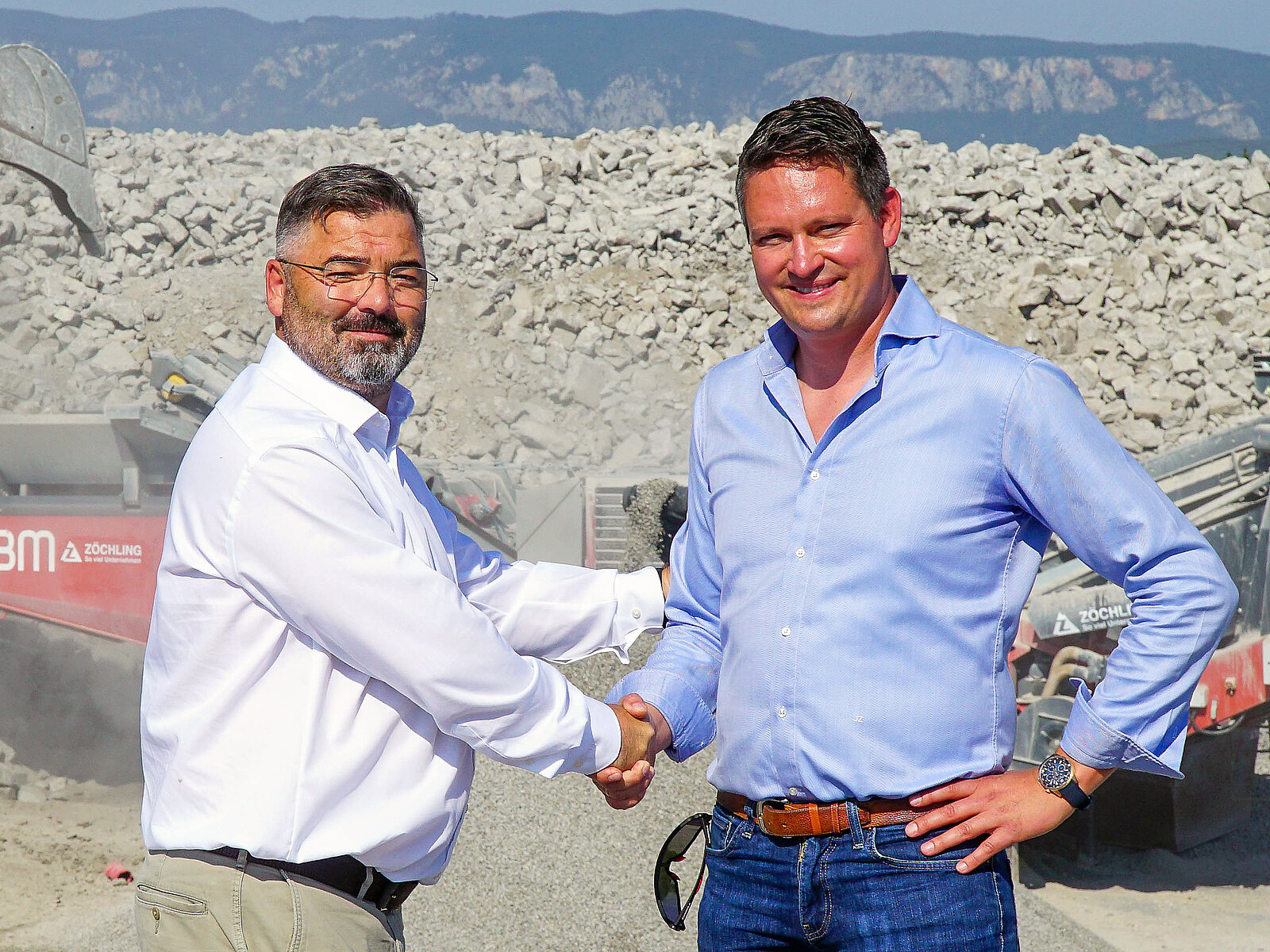Pacesetter in the construction materials cycle
From April 2025 to October 2026, the company STRABAG AG will be refurbishing an 11-kilometre section of the Southern motorway A2 south of Vienna with three lanes in both directions in two stages. In this project, particular emphasis will be placed on saving resources and protecting the climate by high recycling rates and material circulation of the used road construction materials. This applies to the refurbishment of the roadbed, where broken-up asphalt is continuously processed directly on site, but it is also especially important for the approximately 250,000 tonnes of broken-up concrete generated by this project: These 250,000 tonnes are processed to certified recycled aggregates in a temporary ‘recycling/concrete mixing works’ just a few hundred metres away from the construction site sections. Directly on site, two mobile mixing plants use this material to produce the base material concrete for the approx. 350,000 m² of cement-stabilised sub-base and supply the building material for the approx. 310,000 m² of new road pavement to be constructed.
Thanks to the fact that several thousand delivery kilometres for the removal of debris, and the supply of raw materials and concrete can be avoided, this ‘concrete cycle’ will accelerate all processes, significantly reduce costs, and greatly relieve the residents and help the environment. Both contracted companies, Hans Zöchling (Processing) and Mobile Betonkonzepte (MBK, Mobile Concrete Concepts), work with modern plant technology provided by SBM Mineral Processing, which once again highlights the special position of the Upper Austrian high-tech manufacturer as a leading full-package supplier in the fields of mineral processing/recycling and concrete production
Supplying every day 1,450 tonnes of recycled concrete aggregates 0/4, 4/16, 16/32 or, optionally, around 2,000 tonnes/day of base material 0/63 provided in direct processing of broken-up asphalt – all this with just one plant? Since April of this year, the large SBM impact crusher type REMAX 600 of the company Hans Zöchling GmbH situated in Lower Austria has been performing this task at motorway A2. In stand-alone operation, this plant works at the central recycling site with stockpiles of several thousand tonnes per final product and flexibly moves to the construction site after quick dismantling of its triple-deck secondary screening machine.
"Obviously, this means enormous logistical advantages for us," explains Johannes Zöchling, Managing Director of Zöchling Group, which today employs over 500 people throughout Austria in the fields of demolition and recycling, earth work, and transport, and additionally runs several quarries and gravel pits. "At the recycling site, the REMAX 600 produces all final grain sizes from 0/800 concrete demolition material in a single process, achieving hourly outputs of up to 200 t/h. Even with comparable large crushers, this can only be achieved with an added production screen – which means more delivery effort and more space required on site. Depending on the equipment, you also must calculate with more personnel, but definitely with higher fuel costs for the plant combination respectively the equipment needed for primary crushing," emphasises Johannes Zöchling.
"We are operating the diesel-electric plant REMAX 600 at motorway A2 with an average consumption of around 38 litres per hour," explains Project Manager Paul Sabaditsch. Like all mobile crushers made by SBM, the current flagship model is also ‘hybrid- electrified’: Almost all plant drive systems are electrified – if a hydraulic system is essential, the pumps are driven electrically. The main power supply is a 520 kVA onboard generator, which keeps the speed of the upstream diesel engine constantly low during diesel-powered operation on the construction site. If mains power supply or another external power supply is available, the plant REMAX 600 can be plugged in within minutes, while fully keeping all plant functions.
Zöchling teams have been working with the SBM flagship for more than four years. Like numerous other technological innovations developed by the pioneers in hybrid technology from Oberweis, Upper Austria, over the past 30 years, the 600 series also underwent extensive practical testing in the companies of Zöchling Group, involving several prototype and pre-production stages. At the same time, the company is actively supporting the ongoing SBM development project of the AI-supported ‘autonomous crusher’ in collaboration with the University of Leoben, Austria. Thanks to its unique combination of several processing stages, REMAX 600 forms the technological basis for this project, making direct feedback and input from quarry and recycling professionals even more important for researchers and engineers.
"We directly benefit from this exchange as the plants are precisely tailored to our requirements in the field or to the demands of our customers for the end products," explains Johannes Zöchling. This was also the case with the two magnetic separators presented by SBM on REMAX 600 for the first time at BAUMA: "The triple-deck secondary screening machine with built-in longitudinal discharge by magnetic separator can be quickly dismantled, allowing REMAX 600 to fully exploit the advantages of its 1400 impact crusher as a primary crusher with an output of up to 600 t/h. Without the need for further modifications, the magnetic separator at the main discharge belt already removes most of the metal from the coarse grain."
This also applies for the triple air separation system, which SBM now offers for all stages of the triple-deck secondary screening system with a total screening area of almost 30 m²: "Just like all other devices, the wind sifters remain on the plant during transportation and are easily and immediately ready for use. This makes the new plant very economical, and its high efficiency in separating wood and other light materials ensures high-quality final products that meet even the most challenging specifications."
This also pays off in the refurbishment of motorway A2: Without further processing, the recycled aggregates are delivered to the two mobile SBM concrete mixing plants type EUROMIX 3000 from Mobile Betonkonzepte GmbH (MBK). The key element in the construction materials recycling process is less than 200 m long: A wheel loader loads the recycled aggregates directly from the temporary stockpile into the aggregate hoppers of the two mixing plants, which are positioned directly next to each other. During the almost 16-month construction period, the two 130 m³/h plants will deliver a total of 75,000 m³ of base material concrete with a recycling content of 90% in four around one-month phases, as well as a further 15,000 m³ of hard-rock based top layer concrete. The two plants work independently to ensure the parallel supply of both types of concrete, but also to allow the flexible fulfilment of peak demands, depending on the construction site planning.
The whole plant needs truly little space thanks to the 90° positioning of the two aggregate hoppers, the 69 m³-cement silos flexibly placed next to respectively behind the mixing units, and the shared additives storage and control container for both EUROMIX plants. Even at peak capacity, this ensures reliable feeding of the aggregate hoppers and fast and safe loading of the different concrete types onto dumpers or truck mixers. The modular design of all components facilitates ready-to-use installation of the entire plant in just one and a half working days requiring only five mobile foundations for the cement silos. Day-to-day operation is also very cost-effective thanks to highly automated processes: Ready for delivery around the clock, three operators produce the required quantities mainly at night, the average production per 12-hour shift being around 1500 m³.
A total of 18 EUROMIX mixing plants with hourly outputs of 80 to 175 m³/h of hardened concrete and numerous project-specific combinations of high-tech modules made by SBM currently represent the quickly available machinery and plant equipment of the German Austrian company MBK, headquartered in Munich, Germany, with a subsidiary in Röthelstein, Styria. As one of the leading specialists in the German-speaking and surrounding European countries, the enterprise, which is now part of Schwenk Group, has been supplying concrete to large construction sites in road and tunnel construction, power plants, building construction and civil engineering since 2009. In addition to providing the required concrete qualities based on precisely developed concrete technology concepts, MBK upon request also manages the professional recycling of excavated or demolished materials and the logistics of raw materials. This is the case at motorway A2, where MBK coordinates the delivery of the required hard rock and the supply of cement and construction chemicals.
The excellent interaction of modern production technologies substantially contributes to the conservation of resources. Processing and production directly on site ensure short delivery routes, thereby significantly reducing fuel consumption and CO2 emissions,’ says MBK Managing Director Ewald Köllner, appreciating the trendsetting project.
